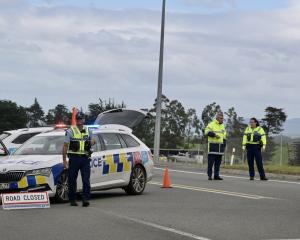A group of workers from a local Dunedin business survived on pure human instinct after being trapped for days without power and water in the Mexican city of Acapulco after a category five hurricane swept through the area. Laine Priestley reports.
Employees from a Dunedin engineering company got more than they bargained for when their work trip ended with them stranded and scavenging for clean water following a Hurricane in Mexico last month.
Site Weld operations manager Chris McBride was in the Mexican city of Acapulco with company owners Steph and Adrian Olsen and adviser Jamie Wilson as part of a New Zealand Trade and Enterprise (NZTE) delegation for a trade show being held in the city.
Hurricane Otis tore through the city damaging buildings, flipping cars and uprooting trees.
The hurricane was originally labelled a category one storm, but over 12 hours built into a category five hurricane.
Nasa labelled it one of the strongest storms in recorded history to hit the Pacific coast of Mexico.
As of November 17, the official figures were 49 people killed and 26 missing.

However, following the event and back at their seventh-floor accommodation the storm started to blow.
"The wind was really starting to push the building and rattle the place.
"By around 1am, Jamie and I ran inside to Steph and Adrian’s room and there was suddenly a massive ‘boom’."
The four then ran into a bathroom and hunkered down as the storm raged outside.
"I was watching the walls just bowing in, and the whole building was gyrating, banging and crashing," Mr McBride said.
"We literally looked at each other like we were gonna die. This is the end."
After 30 minutes of huddling together in the bathroom, the storm died down and the group left the room.
"When we opened the door, it was like the apocalypse."
The room’s windows had blown out, an entire wall was gone, water covered the apartment, and their belongings were strewn around the room and out the gaping hole in their apartment.

General manager Steph Olsen said it was amazing none of them were hurt.
"We came out to everything absolutely destroyed around us and there wasn’t a single scratch on any of us — it was just good, dumb luck."
Mr McBride said sirens were whirring in the darkness, mass looting was starting, and gunshots and screams could be heard following the destruction.
"It was a surreal situation. We were just in fight or flight and living off pure human instinct."
Without power, the group were unable to get word to loved ones back home.
The road to the city was also blocked by a landslip, making entry and exit of Acapulco impossible, stopping military and relief from coming through for two days.
Mr McBride said during the two days they were in the city, it was "just a free-for-all".
"We were high enough we could see all the looting.
"We just barricaded all the doors and if we went down, we’d go down in pairs and make sure that we had some sort of protection on us."
The group spent their days looking for water, scrounging for food, and helping others in any way they could.

At night, the group slept in their destroyed accommodation on soaked mattresses in 30°C heat in a room with a missing wall and a sheer seven-storey drop.
"We were literally just lying on on a wet bed in the middle of like a wind tunnel — I was just happy to have a bed," Mr McBride said.
While out searching for supplies, the group would leave clean drinking water outside places people were taking shelter.
On day two, someone a few houses down with a surviving generator managed to hook a Wi-Fi modem up and the group was finally able to get word out that they were safe.

"We were tipping bikes and buggies over to get enough fuel to get out of the city."
After two days the landslide was cleared and getting out of the city was possible, but the group had no transport and nobody in the group spoke Spanish.
They used the fuel as a bargaining tool to get themselves seats in cars heading to Mexico City.
They were all split up, Mr Wilson got a seat in a van while Mr McBride ended up in the car of a Mexican politician and made it to Mexico City in record time.
"My trip took three and a-half hours because the driver was literally going 180kmh, he was just gunning it to try to get out of the city."
Mr and Ms Olsen were not so lucky, they hitched a ride with a woman in a car with blown-out windows which had been flooded during the hurricane.
Ms Olsen said the trip from Acapulco to Mexico City usually would take about four hours.
The ride took the Olsens close to 10 hours.
Ms Olsen said the hardest part was not being able to contact home.
"My daughter works at reception at Site Weld. That was really tough because she had all of our Site Weld family asking if we’re OK ... and she knew absolutely nothing.
"She was looking after my younger children as well. We knew we were OK but our families knew nothing."
The group rendezvoused in Mexico City and managed to get home to New Zealand and their families.











